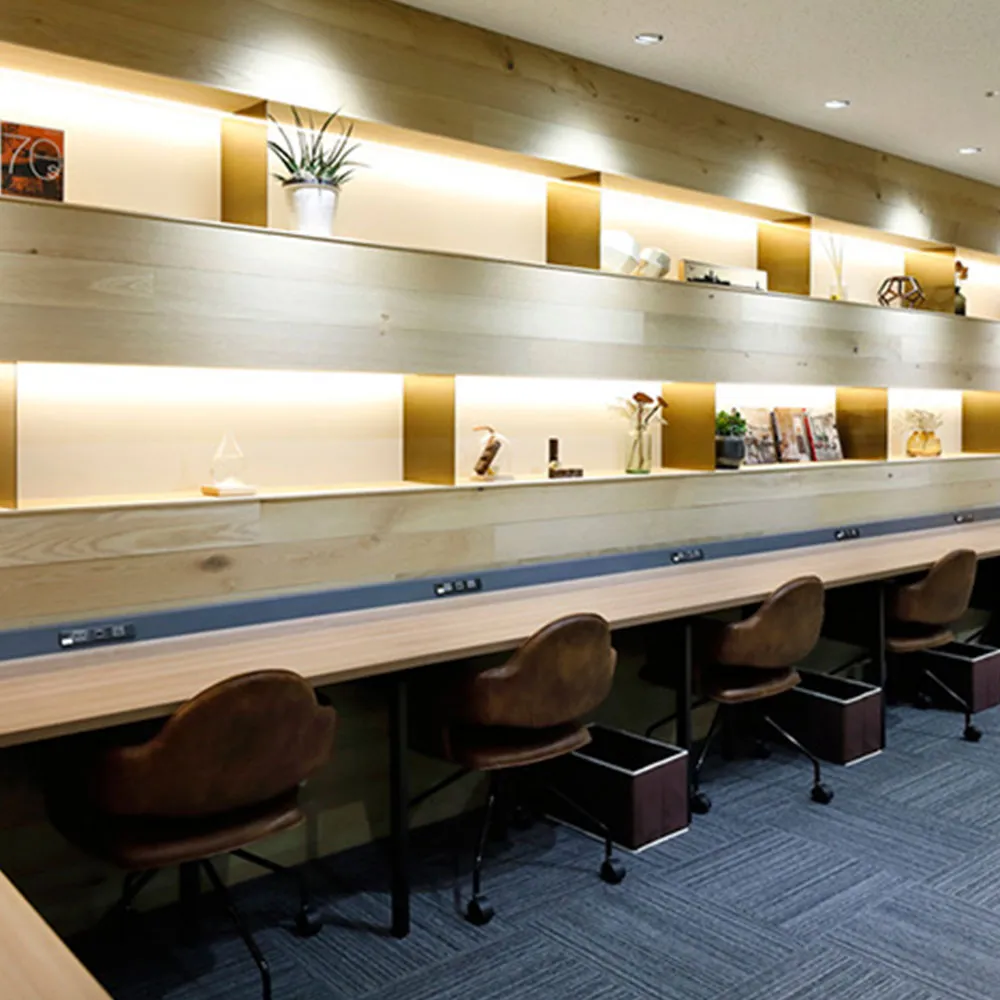What is a shared office? Features, Benefits, and How to Choose
Update:2025/4/9

Along with reforms in the way people work, SOHO* and other workstyles that are not restricted by time or place have become widespread, and work styles that differ from traditional office work are attracting attention. Under these circumstances, major real estate companies and others have opened “shared offices,” where workspace is shared by many people, one after another, mainly in urban areas.
If you are reading this article, you are probably interested in share offices. In this article, we will introduce the characteristics of share offices, their advantages and disadvantages, and points on how to choose one.
*An abbreviation for “small office/home office. Refers to a form of business in which work is performed in a home or small office.
Contents
- 1 What is a shared office? Features and Functions
- 2 Difference between Shared Office and Serviced Office
- 3 Advantages of Shared Office Space
- 4 Disadvantages of shared office space
- 5 Who is a shared office suitable for?
- 6 Who is not suited to use shared office space?
- 7 Points to consider when choosing a shared office
- 8 Summary
【Tokyo】Search for inexpensive private
serviced offices
Registration available, close to station,
free internet, free meeting rooms,
office furniture available
There are many different types of shared offices, depending on the company that operates them. In this section, we will look at the features and functions of a typical shared office.
A shared office is an office format in which space is shared by several companies or individuals. Basically, there is no dedicated space, but rather a free address system. While typical leased office space is fixed, shared office space allows you to freely choose where you want to work.
The greatest feature of shared office space is that it is shared by several companies and individuals, thus minimizing costs such as rent and utilities. In addition, unlike typical serviced office space, there are no barriers between companies, making it easy to form connections with people from various industries.
The four main functions of a shared office are.
1. Handling visitors
Many shared offices have conference and meeting rooms to accommodate visitors and meetings.
2. Provide work space
You will be provided with a shared space to work and pre-equipped with all the office and electronic equipment you need for your business. Since there is no need to purchase new equipment, you can start working immediately after signing a contract.
3. Address Use
Basically, a shared office allows you to use the address. The address can be listed on business cards and websites, giving clients and users a sense of security. In addition, many of them can also be used as a corporate address, so there is no problem if you want to incorporate your company.
4. Receive telephone calls and mail on behalf of the company
Most of the shared offices have telephone service and mail receiving service. This makes it very convenient for doing business.
Similar to shared offices are serviced offices. Some people may not know the difference between these. Let’s take a look at the differences between shared offices and serviced offices.
Private rooms or free-address are common
In general, it is safe to think of a serviced office as one that rents private rooms and a shared office as one that provides work space in a free-address format. Some shared offices have individual booths or individual seats, but in the case of serviced offices, private rooms are rented from the beginning. Therefore, the difference between a private room or free-address office is the difference between a serviced office and a shared office.
Different companies have different definitions
Shared offices are defined differently by different companies. Shared offices are free-address style, but may have individual booths or individual seats. In addition, some companies provide lockers for storing computers and other items you bring with you. This is not to say that shared offices do not have private rooms.
【Tokyo】Search for inexpensive private
serviced offices
Registration available, close to station,
free internet, free meeting rooms,
office furniture available
Shared office space offers many advantages. Please understand these advantages and use them to help you choose the right office space.
Communication is possible
Because shared office space is shared, tenants work in a shared space, making it easy to communicate with other tenants and interact with other companies. In addition, it is not uncommon to meet people from various industries and business sectors and form personal connections, which can lead to business opportunities.
Offices can be set up in favorable locations
Many of our shared offices are located near major train stations or in business districts with good accessibility. This makes commuting and business activities very convenient and smooth. Furthermore, having an office in a well-known and convenient location gives the company status.
Significantly reduce initial costs and start working immediately
Signing a serviced office lease contract requires payment of a security deposit, key money, and guarantee money, resulting in a high initial cost. With shared office space, however, there is no need to pay a security deposit, key money, or guarantee, and office functions can be used simply by paying an entrance fee and the first month’s rent, greatly reducing initial costs.
In addition, desks, chairs, and MFPs (copying and facsimile machines) essential for business are also provided, so you can start your business immediately after signing a contract.
Low monthly rent
Another advantage is the low monthly rent. Even in Tokyo, rents are very inexpensive, ranging from 20,000 to 30,000 yen per month. Basically, renting an office in Tokyo requires more than 100,000 yen per month. However, with shared office space, you can use a prime location at a low cost, thus reducing running costs.
While shared office space has many advantages, there are also disadvantages that should be noted. If you choose to use shared office space, be aware of the disadvantages as well.
Concerned about ambient noise
When working in a shared space, you may be bothered by noises and phone calls because there are other users around you. For this reason, we recommend choosing a shared office with a silent space or other quiet space for working when you need to concentrate on your work.
Be careful with your personal information
In shared offices, security tends to be lax due to the nature of the space being shared by multiple companies and individuals. Special care must be taken when handling important information such as contracts, documents containing confidential information, and computer data.
Shared offices are suitable for freelancers and startup companies. Some examples of professions that are suited to shared offices include.
Consultant
Consultants are in a profession that requires credibility in addition to previous experience and achievements. Shared offices are often located in central business districts, etc. By including the address on your business cards, you can easily gain their trust.
Remote consulting is also not uncommon today, depending on the type of consulting. There is less and less need to have an office, as you often have to travel to the client’s site. Using a shared office space allows you to meet a wide variety of people from different industries. This makes it easier to seize new business opportunities.
Counselor
Counseling is a profession that rarely requires individual space except for counseling with clients. Some shared offices offer silent spaces for quiet work. Private conference rooms and other spaces are also available for counseling.
In addition, many shared offices are relatively newly built, so they are often clean and comfortable. Since counselors can work as long as they can secure a counseling location, shared offices are recommended as a way to reduce various costs.
Writers and designers
Writers and designers can basically work with a computer. Many freelance writers and designers can work from home. However, some people have trouble concentrating at home, and many use shared offices as an environment where they can concentrate.
Furthermore, writers and designers are creators whose connections with others can lead directly to business. Therefore, meeting people from various industries can be expected to develop into business opportunities. You can broaden the scope of your work by meeting people through shared office space.
On the contrary, some people are not suited for shared office space. Let’s take a look at what types of occupations are not suited for shared office space.
Professional services such as tax accountants and administrative scriveners
Tax accountants, administrative scriveners, and other professionals may not meet the requirements to open an office. The condition is that the space must be occupied to prevent information leakage. While this is difficult to meet in a shared office, it is possible to meet the condition in a serviced office.Tensho’s rental offices offer individual spaces that can also be used as addresses for professional businesses.
Other types of businesses with occupied space requirements
Manufacturing businesses require large machinery, and businesses that need a store also need space to occupy. Therefore, such businesses would not be suitable for shared office space. However, there are examples of retail businesses and manufacturing businesses that use shared office space as a back office for administrative work. If you are in a type of business that requires space to be occupied, shared office space is basically not suitable for you, so you will need to think about how you want to use it.
For industries that handle confidential information
Shared offices are generally free-address style. This makes it difficult to handle confidential information from a security perspective. For those in the temporary staffing or job placement industry, the same condition for opening a business as for those in the professional services industry is that they must have an occupied space to prevent information leaks. If you are in an industry that deals with confidential information, a shared office is probably not the right choice for you.
Finally, here are four things to consider when choosing a shared office space. Let’s take a look at what to look out for when choosing a shared office.
Is the location good?
Most shared offices are located in central Tokyo or near major train stations. However, there are exceptions, so it is important to check the location beforehand. If possible, it is a good idea to visit the office and check how many minutes it is from the station.
Are the facilities adequate?
The facilities and services provided are also important. Facilities and services provided in shared offices include the following.
- Reception Service
- Equipment such as multifunctional machines (copying and facsimile machines)
- Business meeting space
- Mail pickup and delivery service
- Free drink service
- Available 24 hours a day
The facilities and services you seek will directly affect the usability of the share office. Therefore, be sure to check carefully when making your choice.
What is the atmosphere like among other users?
The atmosphere of other users is also an important factor in choosing a shared office. If you actually use the office and find that some people “don’t fit in a bit…”, you may not like coming to work. As a countermeasure, we recommend taking a tour of the office and asking the owner and users about the atmosphere before signing a contract.
Can I register a corporation?
Basically, shared offices can be registered as a corporation, but in some cases this is not possible due to regulations or other reasons. Therefore, it is important to check in advance whether corporate registration is possible.
Summary
Unlike serviced offices, shared offices are a free-address office format. Basically, you work in a shared space, but in some cases, individual booths or individual spaces are available.
Shared office space is not suitable for all types of businesses, so care must be taken. When choosing a shared office, be sure to understand the advantages and disadvantages as well as points to be aware of, and choose carefully and without haste the property and plan that meets your requirements.






